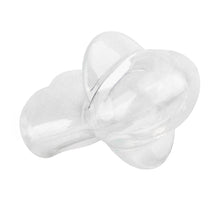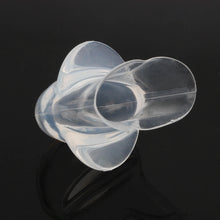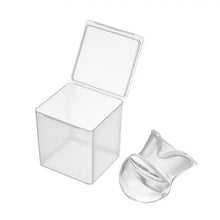
Info: Anti-Snoring Aid, in Transparent Container Box
The Aviva Tongue Stabilizing Device (or TSD; also known as a Tongue Retaining Device, or TRD) is a non-invasive and inexpensive device that can provide a natural, simple, and easy solution for the treatment of problem snoring.
Info: Anti-Snoring Aid, in Transparent Container Box
The Aviva Tongue Stabilizing Device (or TSD; also known as a Tongue Retaining Device, or TRD) is a non-invasive and inexpensive device that can provide a natural, simple, and easy solution for the treatment of problem snoring.
Product Notes:
Snoring can not only disrupt your (and your partner's) sleep, but also affect your health and job performance. Often, it's caused by the position of your tongue, withdrawing to the back of the throat and partially obstructing the airway.
Tongue stabilizers are a safe and easy to use solution to help ease snoring and may be beneficial for other breathing-related sleep conditions. Made from soft, medical-grade silicone*, a tongue stabilizing (or retaining) device holds the tongue in the forward position, staying in place with gentle negative suction to help reduce or even put an end to that endless cycle of unconsciously stopping breathing and then gasping for breath and swallowing air.
TSDs featuring a design similar to this have not only been found to be able to help diminish or even eliminate snoring, sleep-disordered breathing, and sleep apnea, but also to benefit those with Temporomandibular Joint Dysfunction (TMD/TMJ), and to reduce tooth clenching and grinding.
And unlike some anti-snoring devices, no special fittings, cleaning, sleeping positions, nor electricity, are required for a tongue stabilizer to work effectively. The clever design of these tongue stabilizers mean they don't attach or anchor to the teeth; they can even be used if you have dentures.
Easier to use and considerably more affordable than some other treatments, TSDs are recommended by doctors and dentists, and can help some users immediately.
Reviews / Customer Testimonials
"I have found the TSD to be an effective and easy to use device. It is actually quite comfortable to wear once you become accustomed to it. I wear it all the time now."
-- Dr. David Christie, DDS, Victoria, Canada
Hi Nathan, just a note to give you some feedback on the tongue stabilizing device for sleep apnea. My husband was diagnosed a number of years ago with obstructive sleep apnea at the Sleep Clinic at St. Boniface Hospital. A dental device to position his jaw forward was recommended for him. It was custom made by a dentist in Winnipeg and cost more than $800. It caused significant TMJ discomfort and was difficult to tolerate and eventually broke. Since then, my husband has tried various pillows, etc. for positioning so that he remains on his side to sleep. This decreases his apnea but he experiences hip pain from sleeping on his side.
We recently heard about the TSD from my son and bought one for my husband to try. It has taken him a little while to become accustomed to it but has found it has eliminated his apnea. He has a much better quality of sleep now. We just purchased a second one, as a spare. It is easy to travel with and is easy to clean. It does not pull the jaw forward, so no TMJ problems. It is a great product that could benefit many people.
-- H. Perrett, Winnipeg, MB
I have used a TSD for 3 years now. I have suffered from sleep apnea for the last 12 years. I use a bipap machine at high pressures. I use the tsd with my bipap machine to increase the airflow. The tsd is helpful to prevent snoring and may be sufficient for preventing some apneas. For me, the tsd picks up where the bipap machine leaves off. The bipap machine is prescribed by my pulmonologist.
My tsd is prescribed by my dentist. I was wearing a jaw positioner initially but it was ruining my teeth alignment for chewing. The bipap machine is a life saver but it is by no means a perfect solution. When seals leak, hoses crush, sleeping positions hamper the effectiveness of the air flow, the tsd complements the bipap machine. When I camp or don't have access to my bipap machine or electrical power, the tsd lets me sleep without waking with a horrible headache or doing damage being deprived of oxygen. My oral configuration requires me to use the tsd with the large spacer. Since I also grind my teeth, the tsd is an excellent way to prevent that problem too. Sleep apnea has changed my life, but I'm not just going to roll over and let it kill me. My tsd is an important part of my fight against sleep apnea.
-- Steve Roth, Florida
Snoring is the health warning. Do you...
• disturb your partner's sleep?
• suffer from high blood pressure?
• have reflux episodes at night?
• feel tired during the day?
• fall asleep at inappropriate times?
• have morning headaches?
• awaken gasping for air?
• cause your partner to awaken you because you stop breathing?
A tongue stabilizing device may stop or help reduce sleep disordered breathing, reduce daytime sleepiness, alleviate nighttime reflux, and lessen the incidence of morning headaches.
Benefits
• Simple to use.
• It holds the tongue forward during sleep to prevent it from obstructing the airway
• Intuitive fit, doesn't require fitting from a specialist.
• Does not fit to the teeth or jaws like traditional mandibular advancement devices.
• Can be used immediately, requires no impressions, no adjustments and has no moving parts.
• It is indicated for patients without teeth
• It can be used for patients with periodontally compromised dentition
• Ideal for patients with temporomandibular joint dysfunction (TMD/TMJ)
• It works by increasing the three-dimensional airway space
• Small and portable - great for travelling
Treatment of Obstructive Sleep Apnoea (OSA)
Snoring and symptoms of OSA may be alleviated by lifestyle changes such as losing weight, regular exercise, and avoiding alcohol, heavy meals, and inappropriate medications before sleep. Medical treatment options of OSA include surgery, nasal CPAP machines (Continuous Positive Airway Pressure), and specially fitted oral dental devices attached to the teeth to hold the lower jaw forward.
TSD anti-snoring aids are proven, effective, and easy to maintain. They're a low cost treatment, and (in consultation from your healthcare professional) may be a complementary device to CPAP, surgical intervention, and/or medication.
Quick Facts
• Fits to the end of the tongue using gentle suction
• Intuitive and easy to use - requires no specialist fitting
• Requires no impressions or ongoing adjustments
* Silicone is a type of rubber made from sand, and does not contain BPA.
Suggested Usage:
1) Rinse under hot water before each use to make it easier to apply. Position the device in front of your tongue, horizontally, with the baffles or flaps of the device oriented with your lips, with the V-notch facing down.
2) Push the tongue gently into the open slot on the device. Once your tongue is all the way in place (at which point the baffles will be touching both your top and bottom lips), gently squeeze the large soft silicone 'bulb' on the front of the device to create the desired amount of suction to keep it on your tongue, and let go. This suction is what keeps the anti-snore device in place while you sleep.
For first time users, you might want to experiment a few times with the positioning and amount of suction to make it feel most comfortable and secure. Too much can be uncomfortable on the tongue; too little can result in its falling off during the night. Try it with it in place for about ten minutes before nodding off, too see if it might need adjusting.
3) Optional: most experienced users will use their TSD with their mouths closed, leaving the outer baffles on the outside of the lips. However, if you find the sensations from your 'parked' tongue too distracting or have difficulty swallowing built-up saliva with it in that position, you can also try opening your mouth with the device on, and positioning the baffles between the teeth and the inner wall of your mouth / lips until you get more used to it.
Care & Cleaning:
Rinse in hot water before and after every use. Wash thoroughly once a week, and let it air dry; a "cold sterilant" cleaning solution (such as a blend of peracetic acid, hydrogen peroxide, and acetic acid) can be used for this, but do not use mouthwash or alcohol.
Supporting Science:
The Tongue-Retaining Device: Efficacy and Side Effects in Obstructive Sleep Apnea Syndrome. Journal of Clinical Sleep Medicine. 2009 Oct 15. PMID: 19961027
Warnings:
This standard size tongue retainer fits ~95% of users. As a personal use item; these products are final sale (no returns). Exact appearance of device, case, and packaging may vary.
TSDs are not licensed medical devices and individual results will vary.







